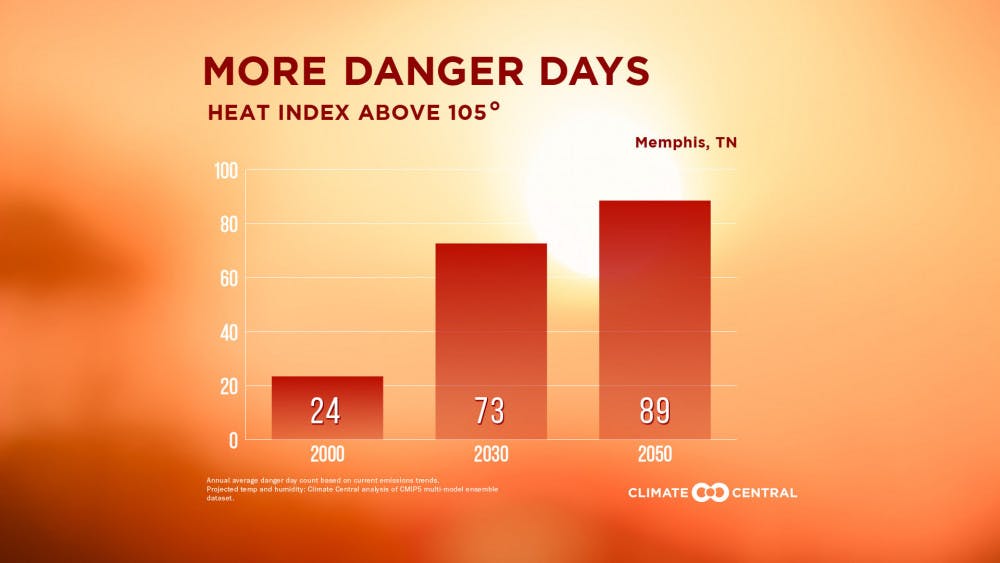The Loewenberg College of Nursing signed a commitment in early January to participate in the Nurses Climate Challenge, a global initiative intended to educate future and current nurses on the health impacts of climate change, including possible solutions and how to educate fellow health professionals.
Loewenberg is one of 50 nursing institutions actively participating in the challenge and the second in Tennessee. Vanderbilt’s School of Nursing is also participating in the challenge. Institutions outside of the state include Johns Hopkins School of Nursing, Notre Dame College Division of Nursing and Duke University School of Nursing.
“When I found this opportunity, it was great to say, ‘Oh, here are some extra resources.’ Because it’s such an important topic,” said Joy Hoffman, a public health nurse and U of M clinical professor.
As part of the initiative, Loewenberg receives resources, such as promotional posters, sample slides for presentations, and regional data. “Nurse Climate Champions” can then use these materials to host educational events like lunch and learn programs among colleagues and other health professionals.
Since the start of the challenge in 2018, over 34,000 U.S. health professionals have received climate and health training. The goal is to have 50,000 educated by the end of 2022.
These tools can also be used in the classroom and shown to future nurses.
“I use the PowerPoint slides in my Community Health Nursing class,” Hoffman said. “They give you examples of how to talk to policymakers and ways to advocate for the climate.”
Kimberly Hathaway and Maria Law, both students in Hoffman’s class, said neither of them had much previous knowledge of climate and its impact on health other than basic assumptions.
“We’ve talked about public and community-based health and what those roles are within the community, and I can see how climate would impact those,” Law said. “In the near future, Memphis is supposed to have inclement weather, and that could affect how public health workers are able to do their jobs, including how and if they can get to a patient.”
As of now, there is not a course exclusively on climate and health. However, Community Health Nursing has an entire chapter dedicated to environmental health and will include information on the Nurses Climate Challenge.
While the Loewenberg N.C.C. chapter is still in its infancy, faculty members hope to integrate climate change into other undergraduate and possibly postgraduate courses in the future. A course for non-nursing students is also under discussion.
Though University of Memphis students outside of nursing aren’t explicitly taught the exact science behind climate change, they are experiencing the effects.
Memphis currently ranks as the hottest city in Tennessee, and it appears the high temperatures are here to stay. A report by Climate Central, a news organization that reports on climate science, predicts that by 2050, Memphis will see nearly three months of heat index over 105.
According to the C.D.C., “small children, the elderly, and certain other groups including people with chronic diseases, low-income populations, and outdoor workers have higher risk for heat-related illness. Higher temperatures and respiratory problems are also linked. One reason is because higher temperatures contribute to the build-up of harmful air pollutants.”
In 2018, Memphis was ranked the fourth worst city in America for allergies and consistently appears at the top of allergy and asthma lists.
High allergens, in conjunction with potential heat-related respiratory effects, raises cause for concern.
“It’s imperative that our students and faculty have an awareness of the impact of climate change on the populations that we serve,” said Dr. Larry Slater, the first-year associate dean of the Loewenberg College of Nursing.
While it may take some time to get everyone up to speed, champions of the initiative look forward to hosting educational events, seminars, and guest speakers to officially kick off the Nurses Climate Challenge.
“Awareness is the first step,” said Slater. “We want to start by bringing awareness to the students we’re teaching, and then we’ll look at expansion across our programs and collaborative efforts across the university to better educate all of our student population on the impact of climate.”
Climate Central, a nonprofit news organization focused on climate coverage, reported that Memphis will see an exponential increase in days where the heat index surpasses 105 degrees over the next 30 years.






